Israel To Pursue Genocide Case Against Iran At ICJ

An Israeli cabinet minister has announced plans to initiate efforts to bring a case against Iran to the International Court of Justice, focusing on charges of genocide.

An Israeli cabinet minister has announced plans to initiate efforts to bring a case against Iran to the International Court of Justice, focusing on charges of genocide.
Gideon Sa'ar highlighted that Iranian leaders have openly advocated for the destruction of Israel and provided significant support to Hamas and other Gaza-based terrorist groups responsible for the October 7 attacks.
Experts in international law suggest that the massacres and other crimes committed by Hamas on October 7 could potentially be categorized as a genocidal act. This is because they appear to have been aimed at the destruction, “in whole or in part”, of a national group, specifically Israelis.
“There are public statements by senior Iranian officials in favor of destroying Israel,” Sa’ar told the Kan public broadcaster.
“Iran finances, arms, and trains all the jihadi terrorist organizations including Hamas and Islamic Jihad which carried out October 7, so in my opinion there is an abundance of evidence which can be submitted to the court in the Hague,” added Sa’ar, a former justice minister.
“Israel is a small and persecuted nation that is fighting for its life and at the same time is fighting on the international stage for its right to self defense. It is a nation that is truly at risk of genocide given that there are enemies around it that declaredly want to destroy it,” he underlined.
The Iranian regime frequently issues threats against Israel. Despite the threats, Tehran has not directly attacked Israel but continues to support its proxies in the vicinity of Israel, especially after Hamas’ surprise attack on Israel on October 7 which killed more than 1,100 Israelis, mostly civilians.
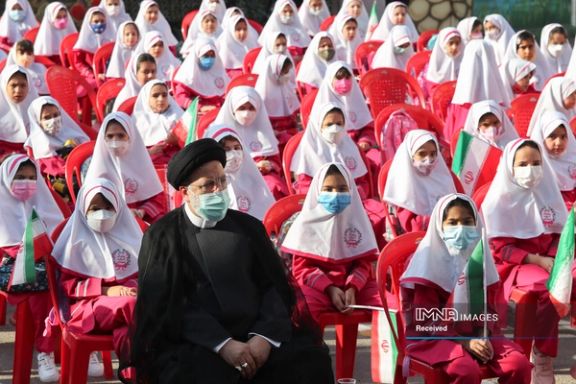
Iran's President, Ebrahim Raisi, has urged action against voluntary termination of pregnancy by women, as the birth rate has significantly fallen in the past decade.
He said on Sunday that there is a need for a "serious confrontation with abortion as an ugly phenomenon" through "religious teachings and artistic productions."
Amid the prevailing economic hardships, which have left many struggling to meet their basic needs, Raisi expressed concern about the downward trajectory of the population. He urged government agencies to harness their resources and capabilities to bolster population growth.
Over recent decades, Iran has witnessed a steady decline in childbirth rates, with the population growth rate dropping from 4.8 percent in the early 1980s to below one percent in recent years.
Supreme Leader Ali Khamenei has called for efforts to boost Iran's population as a top priority and an essential policy for the Islamic Republic, given its position as a leading Shia country in the Muslim world.
In response to Khamenei's directive, the predominantly hardliner-dominated parliament passed a law in March 2022 mandating state entities to actively promote marriage and childbirth. The law also prohibits public health services from offering family planning options.
Critics of the population increase policy argue that the Islamic Republic has failed to improve living standards, with nearly 50 percent of the population living below the poverty line. Many others continue to face escalating economic hardships despite holding multiple jobs.
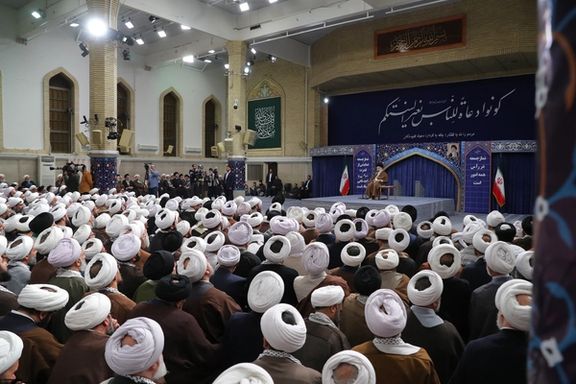
As the hijab issue divides the people and the government in Iran, politicians also debate its impact on the regime’s legitimacy and the upcoming elections in March.
While hardline clerics take advantage of every opportunity to condemn women who defy compulsory hijab, other more pragmatic or opportunistic figures, including Supreme Leader Ali Khamenei are attempting to court women's support in the lead-up to the parliamentary and Assembly of Experts elections.
Khamenei, without specifically addressing the hijab issue, said in a recent speech that "Not adhering to religious obligations in maintaining one’s appearance does not necessarily reflect a lack of belief in the regime."
However, in a meeting with a selected group of veiled women, Khamenei defined women's political participation as "encouraging” their husbands and children to actively take part in the election. The vernacular word Khamenei used for "encouraging" was "vadar kardan" which also implies obliging someone to take a specific action. He added that "women can play a part in this area both at their homes and in the streets."
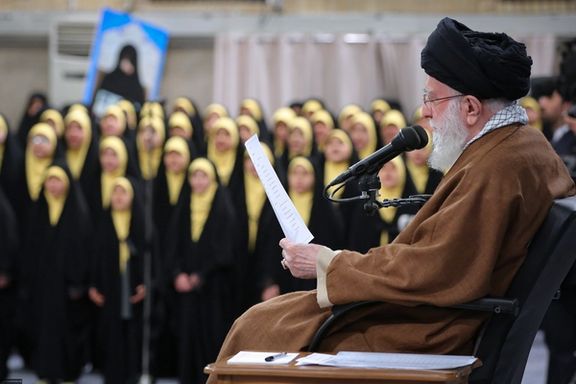
Guardian Council spokesman Tahan Nazif also implied that women without hijab may vote at the polling stations. He said: "No one should be denied their right to vote. The issue of hijab should not divide the people."
According to Ayatollah Hossein Mousavi Tabrizi, the secretary of the association of seminary teachers, the number of women who defy hijab in Qom, the home of the main Shiite seminary and the most religious town in Iran is "eye-catching".
Tabrizi said that defying compulsory hijab is now a symbol of expressing opposition to the government. The cleric added that women from both old and new generations defy the compulsory hijab in the religious center.
He further added that many people in Iran do not believe in the religious rules, adding that on the other hand, religious propaganda in Iran is not consistent with the people's beliefs and customs, although some of the people defy hijab only to show their opposition to the system.
Recently, the police chief in Qom revealed that approximately 74,000 warning text messages had been issued to women defying compulsory hijab since the start of the current Iranian year in March 2023. Additionally, 1,968 women were referred to the court during this period to pay penalties for violating hijab rules, marking a six-fold increase compared to the previous year.
Sociologist Mohammad Reza Javadi Yeganeh expressed concerns that confiscating women's vehicles as punishment for defying hijab could lead to desperation within families, fueling hatred toward the system and potentially sparking civil unrest.
The rise in cases of hijab defiance in a religious city like Qom has been seen by some as a failure of the government's hijab policy. This difference in perspective may explain the disagreement between Mousavi Tabrizi, a former general prosecutor, and hardliners regarding their treatment of women who defy hijab.
In another development, the Friday Prayer Imam of Mashhad, firebrand cleric Ahmad Alamolhoda said in his sermons on January 26, that defying hijab will be eradicated only if the people want it. Meanwhile he called the defiance a mischievous conspiracy by "the enemies." Many Iranian officials, including in law enforcement, have blamed foreign enemies for women rejecting the hijab. But they also blame an expected low turnout in the election on “the enemy,” and not the regime’s economic failures and repression.
Last year, Alamolhoda, who is President Ebrahim Raisi’s father-in-law, opined that the fundamentalist hijab bill prepared by hardliners in the parliament was not good enough to eradicate “the non-Islamic behavior” of Iranian women. Strongly criticizing the bill, Alamolhoda said if it passed, it would promote unveiling rather than prevent it.
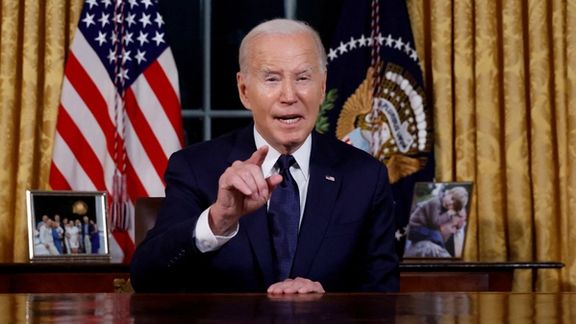
President Joe Biden said the US will respond to an Iran-backed attack on its forces in Jordan, after he announced the news that three US troops were killed.
"We shall respond," he said at a campaign event in South Carolina, asking for a moment of silence. Biden earlier blamed Iran-backed groups for the attack that occurred Saturday night.
“While we are still gathering the facts of this attack, we know it was carried out by radical Iran-backed militant groups operating in Syria and Iraq,” the President said in a statement released by the White House.
At least 34 personnel were being evaluated for possible traumatic brain injury, a US official told Reuters.
"While we’re still gathering facts, this is most assuredly the work of an Iranian-backed militia group," a second official said.
US lawmakers began to react to the news by demanding a tough US reaction to what they see as a major escalation by Iran.
US Senate Republican Leader Mitch McConnell (R-KY) issued a statement, urging the President to be decisive. “Last night, the cost of failure to deter America’s adversaries was again measured in American lives. We cannot afford to keep responding to this violent aggression with hesitation and half-measures," the statement reads.
Senator Tim Scott (R- S. Carolina) issued a tweet saying, "The Biden administration’s appeasement of Iran must end. It’s time for clear and decisive action, and Iran must be held accountable for the malign activities of its proxies."
Senator Dan Sullivan of Alaska fired off a tweet saying, "The President needs to order a clear, lethal and overwhelming response that demonstrates to Iran and to the world that whoever targets our men and women in uniform—or supports these attacks—will face the full might of the U.S. military."
The deaths marked the first fatalities of US troops in the region since war began in Gaza. Biden said the attack occurred on Saturday night. Iranian backed proxy militia forces have launched more than 150 attacks in Syria and Iraq targeting US forces since mid-October.
The attack is a major escalation of the already tense situation in the Middle East, where war broke out in Gaza after Palestinian Islamist group Hamas' attack on Israel on Oct. 7 which killed 1,200, mostly civilians.
Thousands have also been killed in the subsequent Israeli military operation in Gaza, although there is no independent and reliable figure.
While Iran has avoided direct military involvement in the Gaza war, its strategy seems to be using proxy forces to harass the US and Israel.
Iran International reported on Saturday that according to a diplomatic source, the Biden administration is discussing with European allies a scenario to increase sanctions on the Islamic Republic. Iran’s aggressive regional policies since October seems to be the reason the White House has decided to adopt a tougher stance against Tehran.
The US has launched a few retaliatory attacks against militia forces in Iraq and Syria, but the attacks have continued. Critics of President Biden’s Iran policy argue that the United States should directly target Iranian interests to deter Tehran’s proxies.
Iranian backed Houthi forces in Yemen have also launched dozens of missile and drone attacks against commercial vessels and Western warships in the Red Sea area. Commercial maritime traffic has suffered as a result.
While the United States has thus far maintained an official line that Washington is not at war in the region, and does not seek escalation, it has made strikes against targets of Yemen's Houthi forces.
"We will carry on their commitment to fight terrorism. And have no doubt - we will hold all those responsible to account at a time and in a manner of our choosing," Biden said in his statement released by the White House.

Iran has seized a foreign vessel carrying two million liters of smuggled Diesel fuel near the southern port city of Bushehr.
Commander Heidar Honarian-Mojarrad of the Second Naval Region of the Islamic Revolutionary Guard Corps said on Sunday that “The vessel, flying the flag of a country from Oceania, was apprehended 60 miles off the coast of Bushehr port under a judicial order. Fourteen foreign crew members from two Asian countries were detained following the identification of the smuggling activity.”
Honarian announced the completion of legal procedures and the transfer of the vessel's crew to the judicial authorities of Bushehr province. He claimed that the confiscated contraband fuel is being handed over to the National Oil Refining and Distribution Company of Bushehr province in compliance with the law.
He also added that the vessel had been under surveillance since loading fuel and was intercepted upon entering the operational area of the Second Naval Region of the Revolutionary Guards. He did not provide any information as to where the vessel loaded the fuel and where it was traveling to.
Iran's role as a major oil producer and its provision of globally low petrol prices contribute to fuel trafficking activities in the region. Iranian forces regularly target tankers involved in fuel transportation in the Gulf.
The incident follows a similar occurrence in September when Iran seized two oil tankers flying the flags of Panama and Tanzania for allegedly smuggling fuel in the Gulf.
The heightened presence of the US military in the Gulf has also been noted, with accusations against Iran for seizing or attempting to seize vessels in the strategic shipping lane.
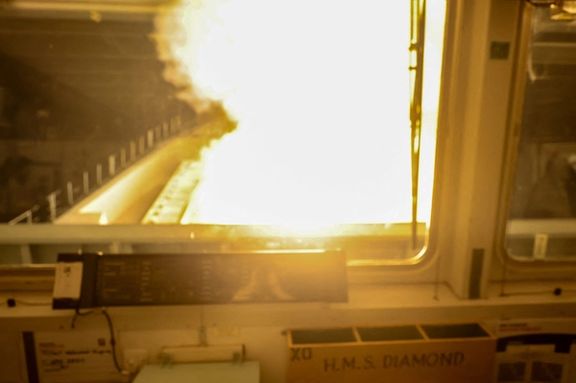
British warship the HMS Diamond has repelled a drone attack from Yemen's Houthi group in the Red Sea, British officials said.
"Deploying her Sea Viper missile system, Diamond destroyed a drone targeting her with no injuries or damage sustained to Diamond or her crew," the Ministry of Defence said in a statement on Sunday.
"These intolerable and illegal attacks are completely unacceptable and it is our duty to protect the freedom of navigation in the Red Sea."
The Iran-backed Houthi movement began launching waves of exploding drones and missiles at vessels on November 19 in response to Israel's military operations in Gaza. Israel launched its offensive after Hamas, another Iran-backed group, invaded Israel, killing 1,400 mostly civilians and taking hundreds of hostages.
On Friday, Houthis claimed responsibility for a missile attack that set a British oil tanker on fire in the Gulf of Aden. Shipping data suggests the Marlin Luanda was heading towards Singapore under the flag of the Marshall Islands. It was hit by a missile 60 nautical miles southeast of Aden in Yemen, according to UK Maritime Trade Operations.
Reports suggest the tanker is carrying Russian naphtha. This fully contradicts Houthi claims that they target vessels bound for Israel of linked to Israeli interests.
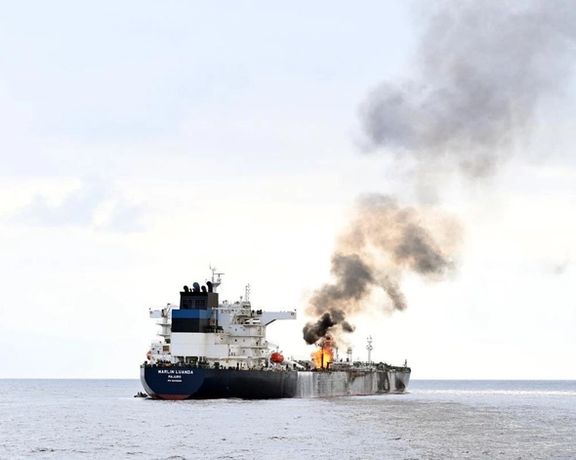
Earlier Friday, the Houthis had fired an anti-ship missile toward USS Carney. That missile was successfully shot down, according to the US Central Command.
The attacks come amid reports that China has called on Iran to rein in the Houthis.
US and British warplanes, ships and submarines have responded to the Houthi attacks on shipping with dozens of retaliatory strikes across Yemen against Houthi forces.